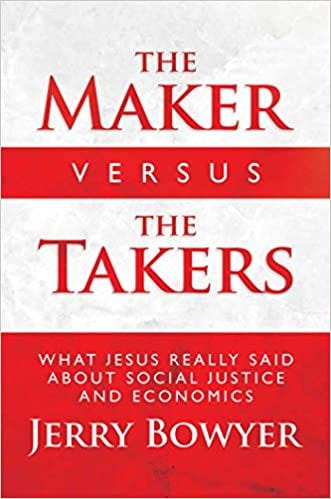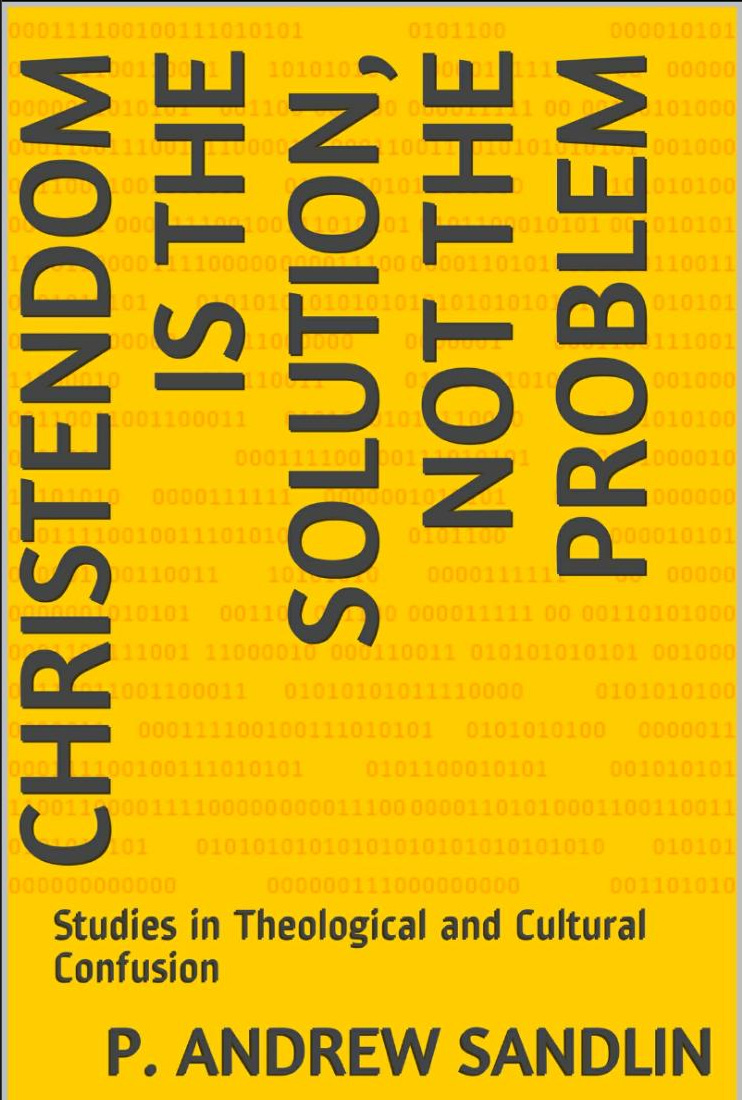Jesus' Capitalism
This book is among the top three economic books I’ve ever read. We throw superlatives around promiscuously these days, including the word “extraordinary." This is a genuinely extraordinary book.
Dear friends and supporters,
Economics is not a field of my academic expertise; but as a cultural theologian, I’ve been obliged to investigate economics and a distinctively Christian approach to it. In the process, I’ve acquired a reasonably workable economic knowledge beyond the rudiments. I’ve read a number of books and articles on the topic, both academic and popular, and given it a lot of thought and even lectured on economics occasionally. CCL’s annual symposium in San Francisco on Saturday, December 4 will feature the theme of economics; contact me if you’re interested in attending. So, my and CCL’s interest in economics is more than casual.
But I must say, I’ve never read a book quite like Jerry Bowyer’s The Maker Versus the Takers: What Jesus Really Said About Social Justice and Economics, hands-down the best Christian book on economics I’ve ever encountered, and among the top three economic books I’ve ever read. We throw superlatives around promiscuously these days, including the word “extraordinary.” This is a genuinely extraordinary book.
In the interest of full disclosure, Jerry is a long-time friend and CCL’s Senior Fellow of Theology and Economics. In his day job he’s founder and president of The Affluent Christian Investor and a nationally known public intellectual and policy expert. Even if he and I didn’t maintain a warm relationship, however, I’m certain that my verdict on this book would’ve been identical.
The Thesis
Jerry’s project in this work seems simple enough: what did Jesus really teach about wealth and poverty, and how does that teaching relate to the contemporary clamor for economic social justice? What Jerry brings to this project is something I’ve never seen before in any economics book: an exceedingly close reading of the biblical text wedded to a deep historically contextual investigation. I know of no book on economics that even comes close to such intense grammatical-historical interpretation. What was Jesus really saying, and why?
In addition, Jerry does this with a topic generally subjected to remarkable superficiality, even among generally reputable conservative scholars, who should know better. The superficiality generally reduces to one of two interpretive camps.
The Christian Socialists
The first is the Christian socialists, who see in Jesus’ teachings on wealth and poverty a vindication of their own statism and economic interventionism. Obviously the Bible teaches Jesus is inherently on the side of the poor and on rectifying their poverty by government confiscation of wealth and its redistribution. And that is that.
The Christian Conservatives
The second camp is the Christian economic conservatives, supporters of economic liberty, capitalism, if you will, who basically agree with the Leftists that Jesus’ words tend to be sympathetic to interventionism, but who argue that this isn’t what the Bible is really all about, so his teachings on this topic aren’t especially relevant. We need to look elsewhere for moral economic guidance.
Jerry disputes both of these viewpoints. Properly understood, Jesus does not champion economic Leftism, and he most emphatically teaches about wealth and poverty in numerous places.
The Argument
His underlying argument is this:
Jesus … was very concerned about economic exploitation, but [his] economic denunciations were not broad, to-whom-it-may-concern condemnations of all wealth. Instead, He directed His denunciations in very specific geographical and socioeconomic ways, aiming his barbs at the exploitative members of the ruling class. (p. xiii)
Drilling down into the biblical Gospel accounts and relying on recent archaeological discoveries, he notes that Jesus’ warnings to and denunciation of wealth and the wealthy all occur either in Judea or to Judeans, in the southern segment of Israel, where Jerusalem, the religious and political capital, was situated.
That last detail is especially significant, because, as Jerry argues, Jesus is not opposed to wealth and the wealthy as such, but only wealth obtained through coercive political means. If he is opposed to what we term capitalism, it’s “crony capitalism” (“the extractive elite,” p. 64) that he combated, and the Jewish religious and political leaders’ employment of their coercive government position to obtain that wealth.
The economy of the northern part of Israel, Galilee, was comparatively far from the center of Judean religio-political power. Their economy wasn’t based on politics but on what we might term commercial entrepreneurship. People made money by simply trading ancient goods and services. Jesus didn’t criticize this market wealth or the wealthy and, in fact, a number of times commended both.
The Proof
He provides numerous examples of his thesis.
The Moneychangers
For example, Jesus didn’t overturn the moneychangers’ tables in the temple on the grounds that he was opposed to commerce, even commerce in the temple, but because he was infuriated by the fraud being perpetuated by the moneychangers. They had altered the law to charge a 100% markup on currency exchange, a fraudulent policy that hit the poor the hardest (no less true of many economic policies today, p. 20).
Jesus was not inherently on the side of the poor and poverty, but he deplored mistreatment of the poor, particularly on the part of religious leaders and politicians who were in a position to manipulate the law to their own financial gain and to the financial hardship of the poor and common classes. In this, Jesus was standing squarely in the line of the Old Testament prophets.
The Rich Young Ruler
But doesn’t the story of the rich young ruler prove that the wealthy must surrender their wealth in order to follow Jesus as a general principle? In fact, it does not. He was a rich young ruler. The term “ruler” in the Greek text refers to a member of the Sanhedrin who was using his contacts to exploit the common people. Jesus is demanding that he restore his ill-gotten gain (pp. 53-60), something that Zacchaeus, the tax collector (politics again) volunteered to do (pp. 60-63).
Economic Parables
The same is true of Jesus’ economic parables (Part III). The Parable of the Ungrateful Nation, of Lazarus and the Rich Man, and of the Vineyard Owner all reinforce this point — Jesus leveled his economic indictments not at ordinary economic entrepreneurs and traders, what we would today call businessmen, but at religious and political rulers who used their position to exploit the poor and commoners.
The Economy of the Crucifixion
In Part IV, Jerry teases out the economic rationale for even the crucifixion of Jesus Christ. From God’s standpoint, of course, Christ died as a sacrifice for sins to save the world. But this is not what the apostate Jews nor the Roman Empire had in mind at the crucifixion at all. Their concerns were principally economic, and Jerry makes this case.
In my estimation, part V, the concluding chapter, offers its most ingenious argument as to why Jesus consistently maintained this attitude toward the economic views and practices of the Jewish leaders. I won’t spoil it by telling you. You need to buy the book to read it, and that chapter alone is worth the price of the book.
Jesus, Expounder of the Old Testament
Jerry holds the view that the Bible is, as James Jordan once said, “extremely self-referential.” “The most important historical context for the New Testament,” Jerry writes, “is the Old Testament” (p. 131). He is a sworn enemy of hyper-spiritualizing economic texts as though they are actually about the forgiveness of sins or some such ostensibly pious topic. They are about these sometimes, of course, but the Bible itself must teach us this, and a lot of that background is in the Old Testament, which undergirds all of Jesus’ economic teaching.
Conclusion
I have read thousands of books in my lifetime, and at this stage in my life, I know that I probably only have hundreds more to read before I die. I have determined, therefore, not to read books that merely help me understand better something I already know. I want to read books to teach me fresh, new things.
Jerry’s book did precisely that, and in fact it’s one of the three best books that I’ve read over the last few years.
Get it and read it.
Will you consider a tax-deductible donation to CCL via PayPal or Venmo? Or mail a check to CCL, Box 100, Coulterville, CA 95311. God uses you to keep us going — and expanding.
Personal
Sharon and I returned from our first cross-country automobile trip and will be home for about 12 days before starting on our next one.
I’ll be addressing the For God and Truth Conference (Pastor Ernie Yarbrough) in Decatur, Alabama, August 4–7. My two topics are:
1. “Developing A Biblical Theology of Culture: Roots of Grace”
2. “Developing A Biblical Theology of Culture: Fruits of Grace”
I’ll be staying over on Sunday, August 8, to preach at Trinity Free Presbyterian Church.
I’ll also be delivering two intimate-venue talks on “The High Cost of Low Expectation,” one in the Birmingham, Alabama area (Sunday, August 1) as well as the northern Tennessee area (Monday, August 9). These talks are by invitation only, so please contact me if you’re interested in attending.
A number of new CCL publications should be out later this year, but I’ll go into more detail about these later.
Please subscribe to the weekly e-letter of CCL’s Senior Scholar of Public Theology, Dr. Brian Mattson.
Thank you for your prayer and money, which God uses to keep CCL growing in such a remarkable ways.
Yours for the King,
Founder & President, Center for Cultural Leadership
Christendom is the Solution
Man cannot forever endure confusion, even cultural confusion dominating the West. He longs for certainty and coherence. Today, the new developing consensus is secular and Neo-pagan: cancel culture, Black Lives Matter, homonormativity, and statism. This evolving consensus, if successful, will brook no dissent.
The only viable alternative is a new Christian cultural consensus.
This book is about launching that consensus.
You can get the book here. Please consider getting a copy and recommending it to others.
More great stuff:
The Center for Cultural Leadership site is here.
My Amazon author page (print and digital) is here.
You can find my sermons and lectures at my YouTube channel.
Sign up to get my blog updates here.
Here’s my Twitter feed.
If you want to get the free exclusive hard copy publication Christian Culture, please send me a Facebook private message.
The CCL phone number is 831-420-7230.
The mailing address is:
Center for Cultural Leadership
P.O Box 100
Coulterville, CA 95311







